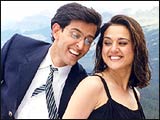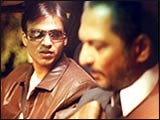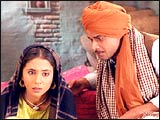 There is one puzzle that baffles all Hindi filmmakers, no matter how successful or experienced they are: what makes a film a hit?
There is one puzzle that baffles all Hindi filmmakers, no matter how successful or experienced they are: what makes a film a hit?
No director, producer, actor, screenwriter or music director has that all-important answer. No has been able to predict what the ever-changing, ever-evolving Hindi filmgoing audience will like. Besides, with cable television offering a slice of Western entertainment, audiences have become very picky about what they want to watch.
| |||||||||||
Though there is no set pattern to the kind of films that will appeal to audiences, a look at the film that clicked in 2003 and January 2004 reveals startling results.
One of the major reasons that made Rakesh Roshan's Koi Mil Gaya a big hit was its novelty. Indians love fantasy, and the notion that there may be another world besides this, seemed very romantic. No Hindi film has had aliens before and that largely worked in favour of the film. Hrithik Roshan's performance was a bonus.
People stayed away from the same old love stories, like Aishwarya Rai-Arjun Rampal starrer Dil Ka Rishtaa, Akshay Kumar-Kareena Kapoor's Talaash and Zayed Khan-Esha Deol's Chura Liya Hai Tumne.
 On the flip side, audiences rejected films that were too alien to them. Ram Gopal Varma trode new paths with his production, Darna Mana Hai. The well-made film included six stories that were not connected to each other. But it did not go down well with the masses. Varma's other well-made production, Main Madhuri Dixit Banna Chahti Hoon, about a small-town girl who comes to the city to become an actress, did not fare well either.
On the flip side, audiences rejected films that were too alien to them. Ram Gopal Varma trode new paths with his production, Darna Mana Hai. The well-made film included six stories that were not connected to each other. But it did not go down well with the masses. Varma's other well-made production, Main Madhuri Dixit Banna Chahti Hoon, about a small-town girl who comes to the city to become an actress, did not fare well either.
Varma's most recent production Ek Hasina Thi, which had terrific performances, had an unusual theme of a woman taking revenge subtly. Heroines have always let their men do the avenging and rescuing, and perhaps that is what the audience still wants. An average woman (Urmila Matondkar) getting her way on her own wasn't quite palatable.
Then again, Varma's directorial venture Bhoot did not have that vital ingredient: songs. But the horror film became a hit, starting a new trend of songless films.
One filmmaker who knows his market well is Karan Johar. His earlier films, Kuch Kuch Hota Hai and Kabhi Khushi Kabhie Gham, were blockbusters. But Karan realised that the bigger market lay in the overseas territories. So he targeted his first production, Kal Ho Naa Ho, at those territories. Kal Ho Naa Ho was a blockbuster overseas and reaped its profits.
 At the other end of the spectrum, critically acclaimed films do not satisfy the audience's palate. Director Dr Chandraprakash Dwivedi cast Urmila Matondkar in Pinjar, which had great performances, a realistic story (based on a novel) and exquisite sets. But it failed.
At the other end of the spectrum, critically acclaimed films do not satisfy the audience's palate. Director Dr Chandraprakash Dwivedi cast Urmila Matondkar in Pinjar, which had great performances, a realistic story (based on a novel) and exquisite sets. But it failed.
Another critically acclaimed film that sank was the recent Maqbool. Vishal Bharadwaj's adaptation of Shakespeare's Macbeth had a stellar star cast: Tabu, Irrfan, Pankaj Kapur, Naseeruddin Shah and Om Puri. It may have been the lack of 'stars' or the dark story that reduced the lines at the ticket counters to a trickle.
Even Rajkumar Santoshi's Khakee, which won rave reviews, faltered at the box-office. Amitabh Bachchan's performance in the film was applauded, coming right after his hit Baghban, but he could not save Khakee.
Now here is something for you: films that reeked of sexual overtones have fared well. Take Jism, Khwahish, Andaaz and Market. These films had nothing to offer but semi-nude heroines and sex talk.
 We are still none the wiser for what really is that winning formula. What made Munnabhai MBBS a hit and LoC-Kargil a flop? What made Tere Naam a hit and Main Prem Ki Diwani Hoon a flop? What made Ishq Vishq a hit and Khushi a flop?
We are still none the wiser for what really is that winning formula. What made Munnabhai MBBS a hit and LoC-Kargil a flop? What made Tere Naam a hit and Main Prem Ki Diwani Hoon a flop? What made Ishq Vishq a hit and Khushi a flop?
Do you have an answer? Let me know!





